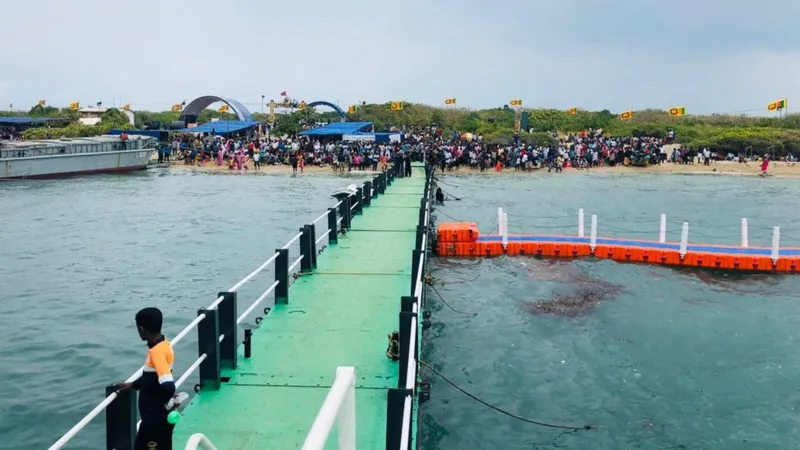
The Indian Ocean has a small, unknown island in it that has been at the Centre of the disputes between India and Sri Lanka for a long time. Katchatheevu Island, with an area of more than 285 acres, has remained the topic of disputes over its historical background, influence on geopolitics and culture. Contrary to its size, the island has become the subject of many controversies, particularly concerning its sovereignty, fishing interests, as well as the two nation’s bilateral relations.
The history of Katchatheevu Island is a reflection of the joint colonial past of India and Sri Lanka. The island that was once under the King of Jaffna and the chief-vassal to upper echelons in the Indian Subcontinent later became part of the kingdom of Ramnad based out of Ramanathapuram, India. It was during the British time, it was, like all other places, administered as part of the Madras Presidency. Nevertheless, after the independence of the island from British rule both nations started to dispute over the sovereignty of the area and each side tried to legitimize its claims.
In 1974, the then Indian Prime Minister Mrs. Indira Gandhi entered into a bilateral agreement with the Sri Lanka government which eventually, with retrospective effect, ceded Katchatheevu to Sri Lanka to resolve maritime boundary issues. Nonetheless, the Indian fishermen of Tamil Nadu, who had been accustomed to fishing in the waters around the island, reacted outrageously.
Nevertheless, the Katchatheevu Island issue was reopened and came to be a forever-discussed issue, months before the general elections in India. While the current Prime Minister Narendra Modi blamed the previous government of Congress Party for “taking wrong steps” in giving up the territory to Sri Lanka, once again strengthening the political dissonance over the island, the matter is still now in debate.
The Katchatheevu Island affair is evolving into a more political concern lately, especially during the times of election in India.
The Katchatheevu Island affair is evolving into a more political concern lately, especially during the times of election in India. The Prime Minister accused the Congress Party of handing the island to Sri Lanka. Hence the issue has consequently become a bone of contention, with both parties involved in allegations games. The BJP’s acts to use this issue for political gain in Tamil Nadu, a state where the party is planning to grow its dominance, have kept the situation in the bubbling state.
Moreover, the leak of some documents revealing that the past governments, with the opposition Congress party headed, did not effectively address the problem also has made the matter could not get better. The BJP discourse tracing the Congress for the loss of Katchatheevu has touched some chords among the electorate, especially in Tamil Nadu where island sentiment runs high.
Also Read: Boycott India Campaign in Bangladesh
Furthermore, some Indian analysts claim that as the agreement has been made without any amendment to the Indian Constitution, there are many doubts about the legality of such an agreement and its implication on the sovereignty of India.
Meanwhile, opponents accuse the BJP of playing opportunistic politics by trying to please the voters from Tamil Nadu who are known to be strict in their territorial policies after a series of incidents which took place during the election time. The synergy of accusations made by Modi against the Congress is by no other than BJP’s historical unconcernedness to the issue at hand. It therefore becomes a difficult task to establish its sincerity. The opposition parties like the Congress and DMK are accusing the BJP of using the grievances of fishermen for the sake of their narrow political goals.
The conflict over Katchatheevu Island is the result of a complicated combination of historical, political, and economic circumstances.
Moreover, in terms of legality and administration, the situation still has not been defined either. However, when it comes to related matters with neighboring countries, e.g. India as the latter states their fishing rights and maritime security, the 1974 Agreement with Sri Lanka may continue to be the subject of debate. Because the re-opening or the re-negotiation of the deal has been challenged in a legal framework, the Supreme Court of India has the matter still undecided.The conflict over Katchatheevu Island is the result of a complicated combination of historical, political, and economic circumstances. Despite efforts to settle the matter through bilateral agreements and legal means, underlying conflicts remain. As India prepares for general elections, the island debate has resurfaced, emphasizing the importance of a comprehensive resolution that takes into account the interests and concerns of all parties.
Ultimately, the resolution of the Katchatheevu dispute is essential not only for bilateral relations between India and Sri Lanka but also for the welfare and livelihoods of the fishermen who depend on its waters. Political parties must prioritize dialogue and diplomacy over rhetoric and opportunism to achieve a sustainable and mutually beneficial solution to this longstanding issue. Only through genuine cooperation and respect for international law can India and Sri Lanka pave the way for peace, stability, and prosperity in the region.
The opinions shared in this article reflect the author’s personal views and do not necessarily align with the institution’s official stance.



















Comments (2)
Amarjeet kr bharadwajsays:
July 18, 2024 at 12:52 pmThe Katchatheevu Island dispute between 🇮🇳 India and 🇱🇰 Sri Lanka remains contentious, especially during elections in India. The island, ceded to Sri Lanka in a 1974 agreement, sparks political debates over sovereignty and impacts Tamil Nadu fishermen 🎣. Resolving this issue needs genuine dialogue and cooperation to ensure the welfare of affected communities and maintain strong bilateral relations 🤝.
binancesays:
August 27, 2024 at 4:03 amYour article helped me a lot, is there any more related content? Thanks!